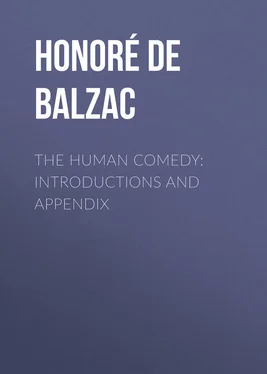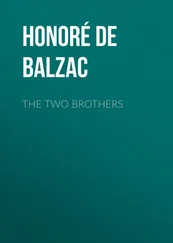Honoré Balzac - The Human Comedy - Introductions and Appendix
Здесь есть возможность читать онлайн «Honoré Balzac - The Human Comedy - Introductions and Appendix» — ознакомительный отрывок электронной книги совершенно бесплатно, а после прочтения отрывка купить полную версию. В некоторых случаях можно слушать аудио, скачать через торрент в формате fb2 и присутствует краткое содержание. Жанр: literature_19, foreign_antique, foreign_prose, на английском языке. Описание произведения, (предисловие) а так же отзывы посетителей доступны на портале библиотеки ЛибКат.
- Название:The Human Comedy: Introductions and Appendix
- Автор:
- Жанр:
- Год:неизвестен
- ISBN:нет данных
- Рейтинг книги:5 / 5. Голосов: 1
-
Избранное:Добавить в избранное
- Отзывы:
-
Ваша оценка:
- 100
- 1
- 2
- 3
- 4
- 5
The Human Comedy: Introductions and Appendix: краткое содержание, описание и аннотация
Предлагаем к чтению аннотацию, описание, краткое содержание или предисловие (зависит от того, что написал сам автор книги «The Human Comedy: Introductions and Appendix»). Если вы не нашли необходимую информацию о книге — напишите в комментариях, мы постараемся отыскать её.
The Human Comedy: Introductions and Appendix — читать онлайн ознакомительный отрывок
Ниже представлен текст книги, разбитый по страницам. Система сохранения места последней прочитанной страницы, позволяет с удобством читать онлайн бесплатно книгу «The Human Comedy: Introductions and Appendix», без необходимости каждый раз заново искать на чём Вы остановились. Поставьте закладку, и сможете в любой момент перейти на страницу, на которой закончили чтение.
Интервал:
Закладка:
Honoré de Balzac
The Human Comedy: Introductions and Appendix
HONORE DE BALZAC
"Sans genie, je suis flambe!"
Volumes, almost libraries, have been written about Balzac; and perhaps of very few writers, putting aside the three or four greatest of all, is it so difficult to select one or a few short phrases which will in any way denote them, much more sum them up. Yet the five words quoted above, which come from an early letter to his sister when as yet he had not "found his way," characterize him, I think, better than at least some of the volumes I have read about him, and supply, when they are properly understood, the most valuable of all keys and companions for his comprehension.
"If I have not genius, it is all up with me!" A very matter-of-fact person may say: "Why! there is nothing wonderful in this. Everybody knows what genius is wanted to make a name in literature, and most people think they have it." But this would be a little short-sighted, and only excusable because of the way in which the word "genius" is too commonly bandied about. As a matter of fact, there is not so very much genius in the world; and a great deal of more than fair performance is attainable and attained by more or less decent allowances or exhibitions of talent. In prose, more especially, it is possible to gain a very high place, and to deserve it, without any genius at all: though it is difficult, if not impossible, to do so in verse. But what Balzac felt (whether he was conscious in detail of the feeling or not) when he used these words to his sister Laure, what his critical readers must feel when they have read only a very little of his work, what they must feel still more strongly when they have read that work as a whole – is that for him there is no such door of escape and no such compromise. He had the choice, by his nature, his aims, his capacities, of being a genius or nothing. He had no little gifts, and he was even destitute of some of the separate and indivisible great ones. In mere writing, mere style, he was not supreme; one seldom or never derives from anything of his the merely artistic satisfaction given by perfect prose. His humor, except of the grim and gigantic kind, was not remarkable; his wit, for a Frenchman, curiously thin and small. The minor felicities of the literature generally were denied to him. Sans genie, il etait flambe ; flambe as he seemed to be, and very reasonably seemed, to his friends when as yet the genius had not come to him, and when he was desperately striving to discover where his genius lay in those wonderous works which "Lord R'Hoone," and "Horace de Saint Aubin," and others obligingly fathered for him.
It must be the business of these introductions to give what assistance they may to discover where it did lie; it is only necessary, before taking up the task in the regular biographical and critical way of the introductory cicerone, to make two negative observations. It did not lie, as some have apparently thought, in the conception, or the outlining, or the filling up of such a scheme as the Comedie Humaine . In the first place, the work of every great writer, of the creative kind, including that of Dante himself, is a comedie humaine . All humanity is latent in every human being; and the great writers are merely those who call most of it out of latency and put it actually on the stage. And, as students of Balzac know, the scheme and adjustment of his comedy varied so remarkably as time went on that it can hardly be said to have, even in its latest form (which would pretty certainly have been altered again), a distinct and definite character. Its so-called scenes are even in the mass by no means exhaustive, and are, as they stand, a very "cross," division of life: nor are they peopled by anything like an exhaustive selection of personages. Nor again is Balzac's genius by any means a mere vindication of the famous definition of that quality as an infinite capacity of taking pains. That Balzac had that capacity – had it in a degree probably unequaled even by the dullest plodders on record – is very well known, is one of the best known things about him. But he showed it for nearly ten years before the genius came, and though no doubt it helped him when genius had come, the two things are in his case, as in most, pretty sufficiently distinct. What the genius itself was I must do my best to indicate hereafter, always beseeching the reader to remember that all genius is in its essence and quiddity indefinable. You can no more get close to it than you can get close to the rainbow, and your most scientific explanation of it will always leave as much of the heart of the fact unexplained as the scientific explanation of the rainbow leaves of that.
Honore de Balzac was born at Tours on the 16th of May, 1799, in the same year which saw the birth of Heine, and which therefore had the honor of producing perhaps the most characteristic writers of the nineteenth century in prose and verse respectively. The family was a respectable one, though its right to the particle which Balzac always carefully assumed, subscribing himself " de Balzac," was contested. And there appears to be no proof of their connection with Jean Guez de Balzac, the founder, as some will have him, of modern French prose, and the contemporary and fellow-reformer of Malherbe. (Indeed, as the novelist pointed out with sufficient pertinence, his earlier namesake had no hereditary right to the name at all, and merely took it from some property.) Balzac's father, who, as the zac pretty surely indicates, was a southerner and a native of Languedoc, was fifty-three years old at the birth of his son, whose Christian name was selected on the ordinary principle of accepting that of the saint on whose day he was born. Balzac the elder had been a barrister before the Revolution, but under it he obtained a post in the commissariat, and rose to be head of that department for a military division. His wife, who was much younger than himself and who survived her son, is said to have possessed both beauty and fortune, and was evidently endowed with the business faculties so common among Frenchwomen. When Honore was born, the family had not long been established at Tours, where Balzac the elder (besides his duties) had a house and some land; and this town continued to be their headquarters till the novelist, who was the eldest of the family, was about sixteen. He had two sisters (of whom the elder, Laure, afterwards Madame Surville, was his first confidante and his only authoritative biographer) and a younger brother, who seems to have been, if not a scapegrace, rather a burden to his friends, and who later went abroad.
The eldest boy was, in spite of Rousseau, put out to nurse, and at seven years old was sent to the Oratorian grammar-school at Vendome, where he stayed another seven years, going through, according to his own account, the future experiences and performances of Louis Lambert, but making no reputation for himself in the ordinary school course. If, however, he would not work in his teacher's way, he overworked himself in his own by devouring books; and was sent home at fourteen in such a state of health that his grandmother (who after the French fashion, was living with her daughter and son-in-law), ejaculated: "Voila donc comme le college nous renvoie les jolis enfants que nous lui envoyons!" It would seem indeed that, after making all due allowance for grandmotherly and sisterly partiality, Balzac was actually a very good-looking boy and young man, though the portraits of him in later life may not satisfy the more romantic expectations of his admirers. He must have had at all times eyes full of character, perhaps the only feature that never fails in men of intellectual eminence; but he certainly does not seem to have been in his manhood either exactly handsome or exactly "distinguished-looking." But the portraits of the middle of the century are, as a rule, rather wanting in this characteristic when compared with those of its first and last periods; and I cannot think of many that quite come up to one's expectations.
Читать дальшеИнтервал:
Закладка:
Похожие книги на «The Human Comedy: Introductions and Appendix»
Представляем Вашему вниманию похожие книги на «The Human Comedy: Introductions and Appendix» списком для выбора. Мы отобрали схожую по названию и смыслу литературу в надежде предоставить читателям больше вариантов отыскать новые, интересные, ещё непрочитанные произведения.
Обсуждение, отзывы о книге «The Human Comedy: Introductions and Appendix» и просто собственные мнения читателей. Оставьте ваши комментарии, напишите, что Вы думаете о произведении, его смысле или главных героях. Укажите что конкретно понравилось, а что нет, и почему Вы так считаете.












